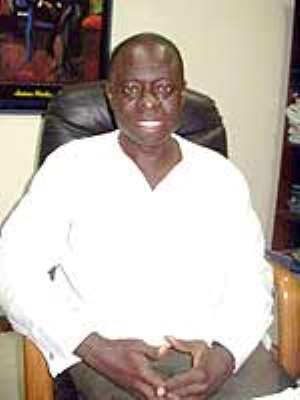
Accra, July 7, GNA - Ghana's democracy would be enhanced if ways could be found to generate economic growth, increase employment opportunities, and reduce the corrosive effects of income inequalities and corrosive effects of corruption, says the Ghana Afrobarometer Round Three Report. The Report concluded that democracy continued to gain ground in the country despite the persistence of poverty, and the patience with economic reform was declining.
Professor Emmanuel Gyimah-Boadi, Executive Director of the Ghana Center for Democratic Development (CDD-Ghana) presented the Report at a media briefing in Accra, on Wednesday.
The Report were the findings of a survey, with 1199 respondents aged 18 and above, nationwide conducted by the by the Ghana Center for Democratic Development (CDD-Ghana) in March 2005, on economic, political and social situations in the country.
It showed that Ghanaians remained fully committed to democratic principles and support for democratic principles remained high, but indicated that a great deal of dissatisfaction with economic conditions PERSIST
The Afrobarometer Round Three Report compared with Afrobarometer 2 Report done in September 2002. The Report Three indicate that unemployment remained on top of the list of problems Ghanaians would want Government to tackle, with most Ghanaians presenting their present living conditions as bad.
Over 56 per cent of respondents perceived a worsening job market situation, as 46 per cent responded similarly in the 2002 Report. Ghanaians expressed a strong opposition to further retrenchment of the labour market from the Public Services. Seventy-eight percent think it was better for all civil servants to keep their jobs, even if paying their salaries was costly to the nation.
More than half of the respondents had a positive evaluation of the Kufuor Administration in combating HIV/AIDS, improving basic health services, reducing crime and addressing educational needs.
The Government however was rated as having performed badly in narrowing the gap between the rich and poor.
The report indicated that Ghanaians attitude to politics are generally liberal and democracy and was a preferred system of government for an overwhelming majority of Ghanaians. Over 80 per cent disapproved of military rule, 85 per cent rejected personal dictatorship and 82 per cent rejected one party rule.
The Report indicated that Ghanaians appeared to be poorly informed about political issues despite their expressed enthusiasm for politics and strong preference for the essence of democracy. "Consistent to the Afrobarometer Round Two findings, over 64 per cent say they find matters of politics and government too complicated to understand" the Report said, adding " is also indicates a gap in civic education.
"Or is the explosion of information in the media confusing rather than educating and enlightening the public?" it asked.
According to Report, Ghanaians relied more on the electronic than the print media for their political information and opinion, with over 60% of the respondents answering that the never read the (Ghanaian) newspapers.
Those who admitted to never reading the newspapers rose from 57 per cent to 63 % in 2005.
Generally, Afrobarometer surveys collect and disseminate information on views of Africans on democracy, governance economic reform, civil society and quality life in 18 African countries. It usually receives funding from Swedish International Development Agency, the Royal Netherlands Foreign Affairs Ministry, and the United States Agency for International Development (USAID) and the African Development Bank (AfDB).
Professor Gyimah-Boadi said the AFDB and the USAID sponsored the Afrobarometre Round Three Survey.




 We’ll no longer tolerate your empty, unwarranted attacks – TUC blasts Prof Adei
We’ll no longer tolerate your empty, unwarranted attacks – TUC blasts Prof Adei
 Bawumia donates GHc200,000 to support Madina fire victims
Bawumia donates GHc200,000 to support Madina fire victims
 IMF to disburse US$360million third tranche to Ghana without creditors MoU
IMF to disburse US$360million third tranche to Ghana without creditors MoU
 Truck owner share insights into train collision incident
Truck owner share insights into train collision incident
 Paramount chief of Bassare Traditional Area passes on
Paramount chief of Bassare Traditional Area passes on
 Two teachers in court over alleged illegal possession of BECE papers
Two teachers in court over alleged illegal possession of BECE papers
 Sunyani: Victim allegedly shot by traditional warriors appeals for justice
Sunyani: Victim allegedly shot by traditional warriors appeals for justice
 Mahama vows to scrap teacher licensure exams, review Free SHS policy
Mahama vows to scrap teacher licensure exams, review Free SHS policy
 Government will replace burnt Madina shops with a new three-story, 120-store fac...
Government will replace burnt Madina shops with a new three-story, 120-store fac...
